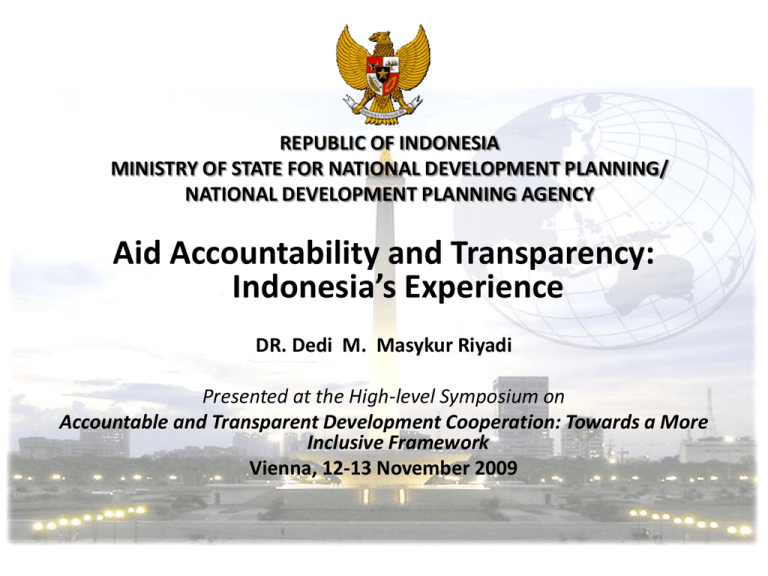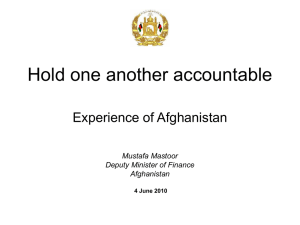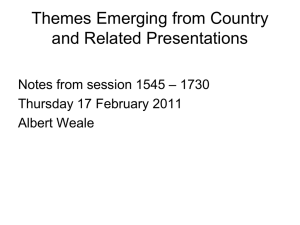Aid Accountability and Transparency: Indonesia's Experience
advertisement

REPUBLIC OF INDONESIA MINISTRY OF STATE FOR NATIONAL DEVELOPMENT PLANNING/ NATIONAL DEVELOPMENT PLANNING AGENCY Aid Accountability and Transparency: Indonesia’s Experience DR. Dedi M. Masykur Riyadi Presented at the High-level Symposium on Accountable and Transparent Development Cooperation: Towards a More Inclusive Framework Vienna, 12-13 November 2009 Background • Paris Declaration (2005) • Accra Agenda for Action (2008) • Jakarta Commitment (12 January 2009) • Aid for Development Effectiveness Secretariat (A4DES) – June 2009 • 74 actions related to aid effectiveness on 20092010 work program; • 6 thematic Working Groups implementing the work program. The Jakarta Commitment • The Jakarta Commitment is a non-legally binding document that build upon the spirit of mutual respect, support and accountability. Signed on 12 January 2009, adopted by 26 donors; • The Jakarta Commitment is Indonesia’s aid effectiveness road map to 2014 - moving beyond Paris Declaration in maximizing the use of resources for development results linked to the achievement of Indonesia’s Medium Term Development Plan up to 2014; • It takes the Paris Declaration further by developing and adopting a country specific action plan, setting time bound and monitorable proposals; • Aid for Development Effectiveness Secretariat (A4DES) is established to ensure GOI have the capacity to take full ownership and to lead the aid coordination and aid management processes. Key Operating Principles 1. Government led 2. Inclusive and built upon existing networks 3. Responsive to policy needs: legitimate and policy-relevant 4. Underpinned by results of monitoring and relevant assessment processes 5. Procedures for measuring and monitoring its effectiveness 6. Subject to critical review as appropriate Accountability & Transparency Within A4DES Framework • Accountability and transparency reflected in: – – – – – The basis of the Jakarta Commitment A4DES structure ; Program formulation; Program design; Program Implementation . • Measures to improve accountability & transparency: – establishment of dialogue with a wider stakeholders; – improvement of aid registration mechanism and regulation to administer aid into Government budget; and – development of Aid Information Management System (AIMS). Objectives (thru A4DES) on Accountability & Transparency • A clearer picture on the state and performance of ODA supported program; • the possibility for a more accurate alignment with the national development plan; • Smoother, better communications among GOI agencies, among donors, GOI and donors, as well as GOI, donors and other stakeholders such as civil society organizations (CSOs); • Better coordination in order to avoid duplication of projects as well reduce the number of donors’ missions • Measuring the effectiveness of ODA supported program. Transparency is important, but it must be managed carefully! The Aid for Development Effectiveness Secretariat (A4DES) Plenary Plenary Members GOI Steering Commitee (SC) Chairman : Deputy Minister for Development Funding Bappenas Members : Echelons-I of Depkeu, Menko Ekon, LKPP, Deplu, Depdagri, Setneg, Bappenas. Selected Development Partners’ Representative Management Committee (MC) Chairman : Director of Bilateral Foreign Funding Bappenas Members : Echelons-II of Depkeu, Menko Ekon, LKPP, Deplu, Depdagri, Setneg, Bappenas WG on Procurement WG on Public Finance Management WG on Dialogue & Institutional Development WG on Monitoring & Evaluation Group of Experts (to back up the WGs) WG on Development of Financing Mechanism WG on Capacity Building & Knowledge Management Technical & Administrative Support Team (Management Office) THANK YOU VIELEN DANK TERIMA KASIH





